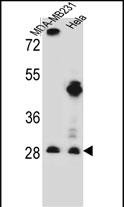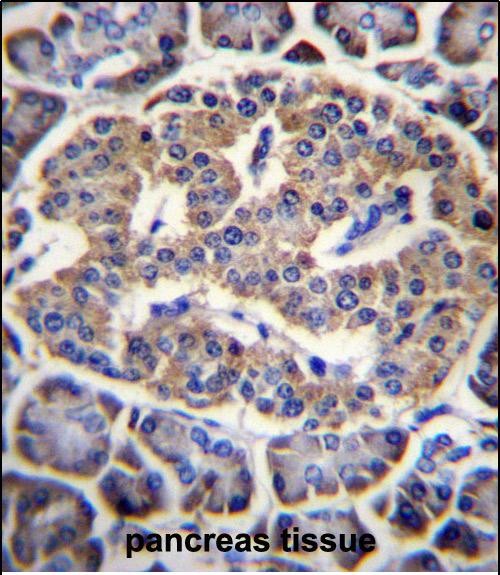

| WB | 1/1000 | Human,Mouse,Rat |
| IF | 咨询技术 | Human,Mouse,Rat |
| IHC | 1/100-1/500 | Human,Mouse,Rat |
| ICC | 技术咨询 | Human,Mouse,Rat |
| FCM | 咨询技术 | Human,Mouse,Rat |
| Elisa | 咨询技术 | Human,Mouse,Rat |
| Aliases | Eukaryotic translation initiation factor 4H, eIF-4H, Williams-Beuren syndrome chromosomal region 1 protein, EIF4H, KIAA0038, WBSCR1, WSCR1 |
| Entrez GeneID | 7458 |
| WB Predicted band size | 27.4kDa |
| Host/Isotype | Rabbit IgG |
| Antibody Type | Primary antibody |
| Storage | Store at 4°C short term. Aliquot and store at -20°C long term. Avoid freeze/thaw cycles. |
| Species Reactivity | Human |
| Immunogen | This EIF4H antibody is generated from rabbits immunized with a KLH conjugated synthetic peptide between 127-156 amino acids from the Central region of human EIF4H. |
| Formulation | Purified antibody in PBS with 0.05% sodium azide. |
+ +
The eukaryotic initiation factor 4H (EIF4H) is a protein involved in the regulation of mRNA translation initiation, a critical step in protein synthesis. As a component of the EIF4F complex, it interacts with other initiation factors like EIF4A and EIF4G to facilitate ribosome recruitment to mRNA, particularly under conditions requiring precise translational control. EIF4H is known to enhance the RNA helicase activity of EIF4A, promoting the unwinding of secondary structures in the 5' untranslated region (UTR) of mRNAs, thereby enabling efficient scanning and initiation of translation.
Antibodies targeting EIF4H are essential tools for studying its expression, localization, and functional roles in cellular processes. Researchers employ these antibodies in techniques such as Western blotting, immunohistochemistry, and immunoprecipitation to investigate EIF4H's involvement in physiological and pathological contexts. Dysregulation of EIF4H has been implicated in cancers, where its overexpression correlates with tumor progression and poor prognosis, likely due to enhanced translation of oncogenic mRNAs. It is also studied in neurological disorders and viral infections, where host translation machinery is hijacked.
EIF4H antibodies help elucidate post-translational modifications, protein-protein interactions, and signaling pathways (e.g., mTOR) that modulate its activity. Their specificity is crucial for distinguishing EIF4H isoforms or phosphorylation states, aiding in mechanistic studies of translation control. Understanding EIF4H's role through antibody-based research offers potential insights into therapeutic strategies targeting translation dysregulation in diseases.
×